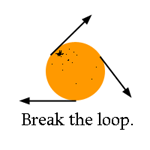

 | Tangentium |
January '04: Menu
All material on this site remains © the original authors: please see our submission guidelines for more information. If no author is shown material is © Drew Whitworth. For any reproduction beyond fair dealing, permission must be sought: e-mail drew@comp.leeds.ac.uk. ISSN number: 1746-4757 |
Social Exclusion, Language and IT: Links and resourcesAs ever, we welcome comments and suggestions on these lists, though note we try and emphasise quality over quantity. This month's links are broken down into these general areas: Electronic Text and HypertextA good place to start, particularly as quite a bit of this month's supplementary essay on electronic text was lifted from them (with permission I would add!), are Martin Thomas's teaching materials from the Leeds University Electronic Text Centre. They also include good bibliographies (online and off) of their own, some references from which are the same as those below. For good printed summaries of the history, development and consequences of electronic text see James Nyce and Philip Khan's From Memex to Hypertext: Vannevar Bush and the Mind's Machine (1992, Boston, Academic Press) or Susan Hockey's Electronic Text in the Humanities: Principles and Practice (2000, Oxford, Oxford University Press). Another oft-cited work is Jakob Neilsen's Multimedia and Hypertext: The Internet and Beyond but I should be honest and say that I have not read the updated version of this book: the 1990 version ("Hypertext and Hypermedia") is an important work, though. Online versions of key texts are available such as Vannevar Bush's As We May Think, Tim Berners-Lee's Information Management: A proposal and a brief History and Philosophy of Project Gutenberg. An excellent technical resource for electronic text technologies can be found at http://xml.coverpages.org. Language and Social EngineeringThough many might find it difficult - and strict Habermasians would find it provocative! - Jean-François Lyotard's The Postmodern Condition (1984, University of Minnesota Press) is an important (and brief) work here. It suggests that ideas of "consensus" are an unattainable ideal in a world where the true freedom of thought and language is restricted by Wittgensteinian language games and where institutions constrain what can and cannot be said or even thought. | |